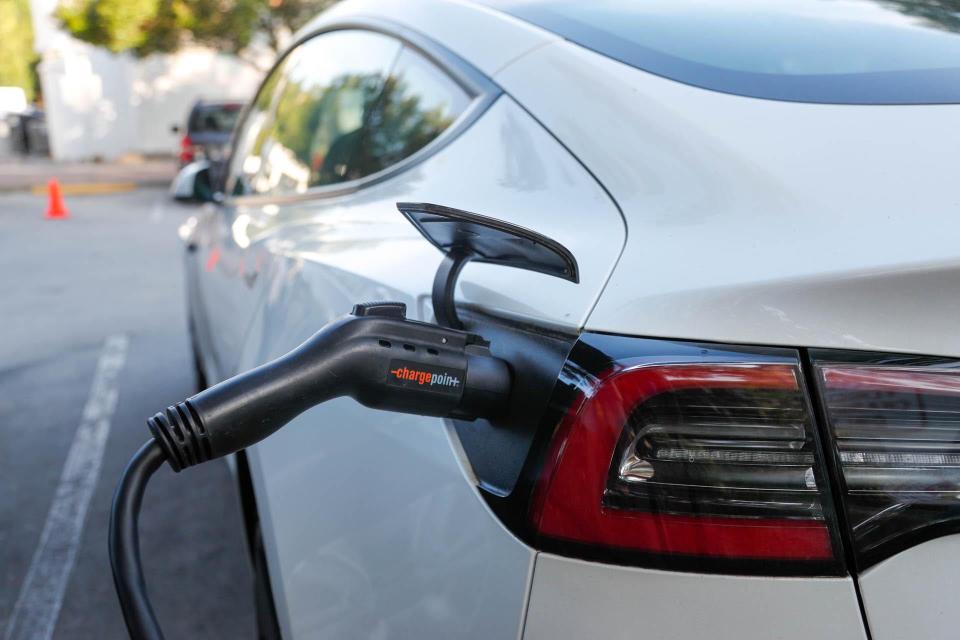Georgia positioned to be 'EV battery belt.' Recycling needs to be part of plan
You’ve likely seen the meme shred on Facebook. It purports to be an electric car graveyard in France. There are variations on the text surrounding the photo, but the conclusion suggested is generally the same: EV’s are bad because the expensive batteries soon go bad and the cars are junked, creating new and excessive industrial waste.
There’s a few problems with this meme, the first of which is that the cars aren’t in France, but are Chinese EVs a half world away. Whatever. I’ve literally been told in Facebook arguments that facts don’t matter when there’s a point to be made.
Fact check: Did France give electric cars to civil servants?

So let’s tackle the central point. Modern electric vehicles are built to last at least as long as cars powered by internal combustion engines, and are likely even more recyclable.
Before getting into those facts, let’s address the general premise and approach of those who have decided to oppose adoption of EVs. Some of the resistance is understandable. Parts of the “Green New Deal” are unrealistic and overreaching. Parts are workable. The devil, as usual lies in the details.
People that wish to argue against a broad agenda they oppose by choosing poor arguments and strategy, then compounding their resistance with “facts” that lack merit or truth, are playing directly into the hands of their opponents.
Separate tech from policy
In the case of electric vehicles, we would do better to separate the technology – which is now proven and quite workable for many of our transportation needs – and the various policy proposals being debated and implemented to promote adoption. The ability to recycle batteries in EVs is very much a feature of this technology, not a bug.
Last week, Georgia Gov. Brian Kemp and the Georgia Department of Economic Development announced that Georgia’s commitment to the manufacturing of EVs will now include a recycling component. South Korean manufacturer SungEel HiTech will build a battery recycling facility in Stephens County.
The Toccoa facility will reclaim the precious rare earth metals that make up modern EV batteries such as lithium, cobalt, and nickel, and prepare them for reuse in new batteries for the next generation of EVs. The company claims a 95% recapture and reuse rate for these materials.
The recycling facility’s location will provide good proximity to battery manufacturer SK Innovation in Jackson County, as well as battery manufacturing facilities planned by Rivian near Rutledge Georgia and Hyundai in Bryan County. It’s further evidence that Georgia’s success in economic development promotes success in economic development.

This isn’t an experimental concept. Tesla co-founder J.B. Straubel left the company in 2019 to found Redwood. The company operates three recycling facilities in Nevada – close to Tesla’s battery manufacturing “gigafactory” – with plans to open a facility in the eastern U.S. soon.
Battery recycling shows big potential
The recycling numbers aren’t yet stratospheric, especially when looked at through the lens of current battery demand. According to Electrek, Tesla estimates that it recycled 1,500 tons of nickel, 300 tons of copper, and 200 tons of Cobalt in 2021.
The company claims it will expand recycling capacity by 50% this year. Why not more? Contrary to the meme lords, most of the Tesla’s on American roads are still in service, with original batteries still providing regular and reliable service.
There will be challenges and issues related to the adoption of electric vehicles. They need to be addressed individually. The folks posting pictures of Chinese EVs claiming they are in France to prove they can’t be recycled are part of the problem, not the solution.
It’s not like we’ve never seen a junkyard filled with 1970’s junked cars without an EV among them. We didn’t let that be an excuse to quit building cars with internal combustion engines, did we?
As for the remaining challenges, Georgia’s legislature will be addressing them directly. A Joint Study Committee between Senate and House members will begin meeting at 9 a.m. on Aug. 24.
Instead of pretending EVs will go away after the next election, the legislature will begin to tackle issues that Georgia will need to overcome as transportation in the state is electrified. This will include not only the charging network needed, but likely also the power generation needed and the ability to distribute that electricity around Georgia’s current and future grid.
Georgia has attracted billions in investment for the manufacture of electric vehicles and the batteries that will power them. It’s more important that we get the policy for adoption and implementation right than celebrate memes to nowhere.
This article originally appeared on Savannah Morning News: Georgia EV manufacturing success attracts battery recyclers

